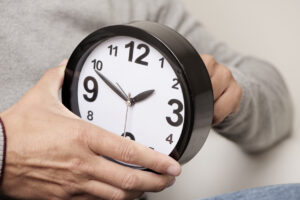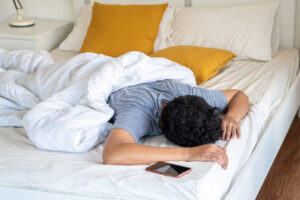
Many attribute – or blame – the idea for Daylight Saving Time to Benjamin Franklin. But that is not exactly accurate.
“Daylight Saving Time is one thing that Franklin did not invent. He merely suggested Parisians change their sleep schedules to save money on candles and lamp oil,” according to an article on the Franklin Institute website. “The common misconception comes from a satirical essay he wrote in the spring of 1784 that was published in the Journal de Paris. In the essay, titled ‘An Economical Project,’ he writes of the thrifty benefits of daylight versus artificial light.”
So, while Daylight Saving Time may have been conceived to save energy and extend daylight hours, it may actually be an “energy vampire.” According to a study from the American Academy of Sleep Medicine (AASM), “55% of US adults feel tired after spring daylight saving time transition.”
“That’s because the change causes a phase shift of our circadian rhythm, the body’s internal clock, and exacerbates the chronic sleep deficiency Americans already experience,” Dr. Carol Ash, a sleep specialist with RWJBarnabas Health, told TODAY.
Circadian rhythm and sleep disruption associated with Daylight Saving Time
Our bodies naturally follow a circadian rhythm, an internal biological clock that regulates the sleep-wake cycle and other bodily functions. The National Sleep Foundation (NSF) suggests that even a one-hour shift in sleep patterns can disrupt the circadian rhythm.
“Humans are most vulnerable to sleep deprivation in early March, as they transition from Standard Time to DST. One study found that the average person receives 40 minutes less sleep on the Monday after ‘Springing Forward’ compared to other nights of the year,” according to the article on the NSF’s website. “…While many people adapt to time changes, some studies have suggested the human body never fully acclimates to DST. Rather, their circadian misalignment may become a chronic or permanent condition.”
While you may think that it is only one hour of added or missed sleep, that hour can affect many areas of your life, according to experts.
“That missing hour of sleep can have a major impact on your alertness, mood, performance, health, and safety,” says Kimberly A. Honn, Ph.D., assistant professor at Washington State University Spokane in the Sleep and Performance Research Center in an article on the NSF website.
Daylight Saving Time & its impact on mental health
Messing with your sleep can impact your mental health and outlook on life. Just ask anyone who has been woken up before they were ready to get up.
“We know from small studies that in people who are sleep deprived, the amygdala, which is the emotional center of the brain, is much more reactive to disturbing images as compared to somebody who’s well rested,” Dr. Charles Czeisler, chief of sleep medicine at Brigham and Women’s Hospital, said in a CBS News article.
The impact that time change has may be greater than just sleep deprivation.
“There seems to be more depression, anxiety, and even suicidal thoughts around the time the clock changes both in March and in the fall,” David Merrill, MD, an adult and geriatric psychiatrist, said in a Health article.
A study published in Epidemiology found that hospital contacts for unipolar depression increased by 11% during the transition from DST to standard time.
“Especially for individuals susceptible to being anxious or depressed, this change in time can trigger an episode of depression or anxiety,” according to Dr. Merrill in the Health article.
Why may there be an increase in these mental health conditions around time changes? According to an article on the Johns Hopkins Medicine website, sleep and a common mental health disorder like depression are intrinsically linked.
“People with insomnia, for example, may have a tenfold higher risk of developing depression than people who get a good night’s sleep,” according to the article. “And among people with depression, 75% have trouble falling asleep or staying asleep.”
Daylight Saving Time and Seasonal Affective Disorder
Seasonal Affective Disorder (SAD) symptoms may also be impacted by Daylight Saving Time. The National Institute for Mental Health (NIMH) website defines SAD as “a type of depression characterized by a recurrent seasonal pattern, with symptoms lasting about 4−5 months out of the year.” The symptoms of SAD may include persistent sadness, feelings of hopelessness, guilt and irritability, and loss of interest in hobbies or activities, among others, according to the NIMH article.
“Seasonal affective disorder is often caused by changes in our circadian rhythm, that internal natural clock that runs our sleep, our mood and our appetite,” according to a quote from Susan Albers, PsyD, psychologist for Cleveland Clinic published on the National Public Health Information Coalition’s (NPHIC) website. “When there is a shift in the season and our access to daylight, our bodies struggle to adjust to the new light and time frame.”
6 ways to lessen the impact of Daylight Savings Time

- Preparation. Instead of waiting until the time changes, consider gradually adjusting your sleep schedule in the days leading up to the time change. Changing your sleep schedule by 15 minutes for several days leading up to the start or end of Daylight Saving Time may lessen the impact. “Try going to bed 15 minutes earlier, starting two to three days before the time change. This will help make sure you are well-rested before the clock change so any resulting ‘sleep debt’ will feel less extreme,” Candice A. Alfano, Ph.D., director of the University of Houston’s Sleep and Anxiety Center of Houston, told TODAY.
- Get the right amount of sleep. “Obtain at least 7 hours of sleep per night preceding and following daylight saving time changes,” recommends to the American Academy of Sleep Medicine.
- Get in the sunshine. Regardless if we are springing ahead or falling back, one way to counteract the impact that Daylight Saving Time has on our bodies is increasing the amount of natural light we are exposed to during the day. This is especially true in the morning. “Seeing light first thing after waking up can help reset your body’s clock, so try eating breakfast in front of a window or making a walk part of your morning routine,” according to the article on the CBS News website.
- Breathe and relax. Consider adding mindfulness and relaxation techniques into your daily routine. Practices such as meditation, deep breathing, and progressive muscle relaxation can help manage stress and improve overall mental well-being.
- Don’t be a hero. “We need to be kind to ourselves and each other since we may not feel as we usually do,” said Dr. Merrill on the Health website. “It’s important to have self-compassion during this tough time of year.” So, if you need a nap, find a way to take a quick one. Take that walk to get yourself moving. Indulge in a hobby or special treat.
- Seek professional help when needed. If the time change significantly impacts your mental health, consider seeking support from mental health professionals. Therapists and counselors can provide coping strategies and tailored interventions to help you so the time change doesn’t change you.
Daylight Saving Time doesn’t have to be a struggle. Prioritize your own well-being and reach out for help if you need it.
To learn more about similar topics, please visit:
- Does Poor Sleep Lead to Depression?
- The Power of Mindfulness in Mental Health
- Seasonal Affective Disorder: Potential Treatments
###
Our articles are for informational purposes only and are reviewed by our Medical Information team, which includes PharmDs, MDs, and PhDs. Do not make any changes to your current medications or dosing without consulting your healthcare provider.
The GeneSight test must be ordered by and used only in consultation with a healthcare provider who can prescribe medications. As with all genetic tests, the GeneSight test results have limitations and do not constitute medical advice. The test results are designed to be just one part of a larger, complete patient assessment, which would include proper diagnosis and consideration of your medical history, other medications you may be taking, your family history, and other factors.
If you are a healthcare provider and interested in learning more about the GeneSight test, please contact us at 855.891.9415. If you are a patient, please talk with your doctor to see if the GeneSight test may be helpful.






